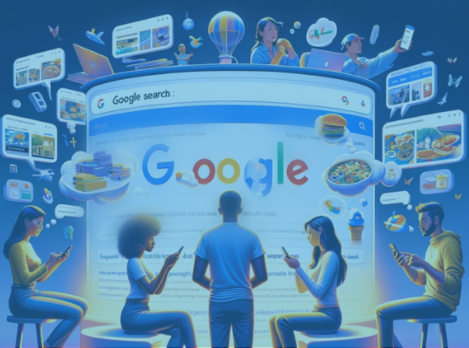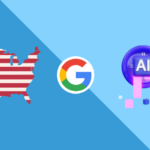Google has recently unveiled new social-like features and enhanced personalization for its search engine. As digital marketers, it is crucial to understand the implications of these changes and how they may affect our future strategies. Google’s success as a search engine can be partly attributed to its ability to deliver personalized results. Since 2004, Google Personalized Search has been providing users with results based not only on the relevance of each web page to the search term, but also on the user’s browsing history. This creates a personalized experience for users while delivering highly relevant search results.
However, like most technologies, Google Personalized Search went through many changes and iterations. Personalization only worked for those who were logged into Google, but that eventually rolled out to everyone. Google began to incorporate social search results in 2009 based on people whom one knows. These are just a few changes which eventually lead to Google collecting over 50 data points to create these personalized results (including location, search history, web history and social networks).
In its latest update, Google has intensified its commitment to delivering a highly personalized search experience, with a strategic emphasis on presenting users with pertinent information aligned with their interests directly within the search results. This enhancement is manifested through the introduction of novel features such as a follow button, results customized to individual preferences, perspective result updates, and the inclusion of creator snippets.
Google Search Follow Button
Google’s latest addition, the “Follow” button in Google Search, empowers users to subscribe to specific topics, enabling Google to curate and display content relevant to those chosen subjects. For instance, if you opt to follow the search query “fashion trends,” Google acknowledges your interest and will show you updates about that followed query when you revisit the search. Moreover, users have the option to enable push notifications, ensuring prompt alerts for new content related to their chosen topics.
Additionally, a prospective section named “News for You” may emerge, presenting news articles tailored to your preferences based on your followed topics. As with typical personalization features, users retain the flexibility to unsubscribe from topics at their convenience.
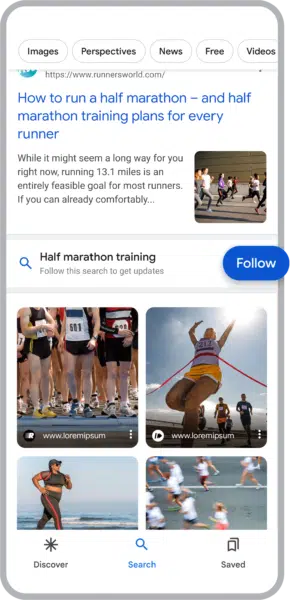
Our Thoughts & Predictions
From Ontario SEO’s Senior Digital Advertising Specialist, Meaghan Butler:
“The new “follow” feature empowers users to proactively share their preferences and broad interests, giving Google a deeper understanding of their users beyond assumptions made based on search behaviour. This shift to user-driven content selection not only will result in a higher quality user experience, but it could also improve the precision of user profiling for advertisers.
Further, the integration of followed topics into the Discover feed potentially creates a new avenue for digital advertisers to connect with a highly targeted audience. Advertisers have traditionally relied on Google search ads to reach high-intent users, but with the “follow” feature, they now might be able tap into a user’s self-reported interests and preferences and target potential customers earlier. This powerful combination of reach and intent could be especially useful for B2B, where buying cycles can be long and complex.”
From Ontario SEO’s Digital Marketing Manager, Jenna Lamb:
“I am interested to see how “followed” results impact the overall search engine result pages.
Will they be preferentially shown over the traditional organic results? If yes, brand-building will become a much more important element to digital marketing than it ever has been before. Competing with a “Followed” website is going to require compelling search listing copy (H1 and meta descriptions) and ideally some brand familiarity.
I don’t expect “followed” websites will impact B2C business directly. However, this feature along with others moves to personalize search, mean that evaluating rankings and measuring impact will be more challenging.”
Results Based on your Favourite Websites
The next major update that Google is rolling out is a new ranking feature that analyzes which sites you visit often and show you those sites more often in the search results. For example, if you visit a certain informational website frequently, Google may decide to rank that informational website’s content over other sites writing about the same topic, simply because it is more relevant to you.
Users do not need to activate anything for this feature, but Google may add labels like “you often visit” to search results that were personalized for you.
Our Thoughts & Predictions
From Ontario SEO’s Senior Digital Advertising Specialist, Meaghan Butler:
“As user feeds and search results become dominated by content from familiar brands, new websites might find it more difficult to compete. In the same token, established brands stand to gain from easier promotion of new offerings, as their new content is prioritized for their existing user base.
Ultimately, search visibility will be driven more by customer loyalty and trust, and new market entrants could be forced to rely more on Google Ads to carve out a space in the SERP. However, a lack of variety and diversity in search results could prove detrimental for users.
For a high-quality search experience, Google will need to strike a delicate balance between prioritizing familiar websites and preserving discoverability.”
From Ontario SEO’s Digital Marketing Manager, Jenna Lamb:
“I think the more personalized the results feed, the larger the dependence on paid advertising for smaller brands/new brands. This is something we see on Facebook already.”
From Ontario SEO’s Digital Marketing Manager, Joshua Waller:
“This could be a fascinating change on the SERP, depending on how much weight they actually put into the ranking factor. On one hand, it could help smaller websites with dedicated followers increase their organic traffic, especially if they don’t rank well against larger sites. On the other hand, it might favor high-traffic websites, allowing them to continue dominating search results even if smaller, niche sites have better content.”
Perspectives in Google Search
The Perspectives feature is something Google has been testing on mobile devices since August 2022. This feature displays insights and “perspectives” from a range of journalists, experts, influencers, and other relevant voices on the topic you are searching for.
This feature is now being rolled out onto desktop and is being updated to show content from various social media platforms, forums, blogs and other online communities. In addition, Google will also be highlighting more information about these creators like their social media handles, follower count, etc.

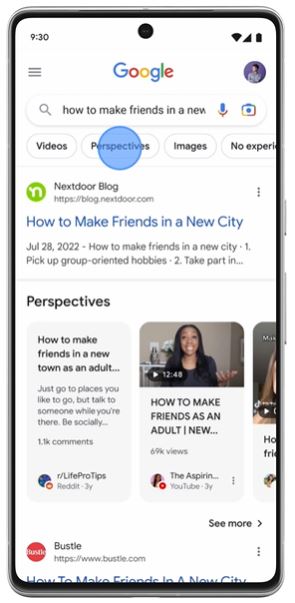
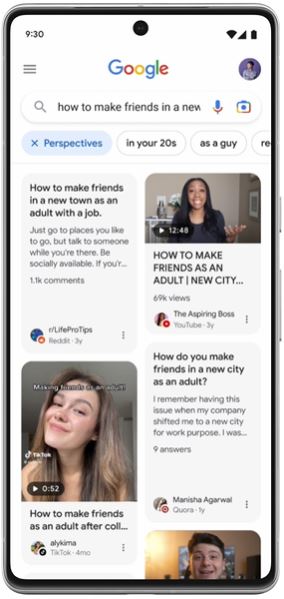
Our Thoughts & Predictions
From Ontario SEO’s Senior Digital Advertising Specialist, Meaghan Butler:
“Perspectives” extends the powerful impact of social media influencers and content creators to Google search. Far from a passing trend for gaining followers, partnering with content creators could become essential factor in gaining search visibility and credibility. Brands should take this opportunity to create or refine their influencer strategy and secure support from relevant creators.
From Ontario SEO’s Digital Marketing Manager, Jenna Lamb:
“Interested to see how this rolls out. Google will need to balance sharing unique perspectives with their existing mandate for helpful content. In some ways these things are in conflict with each other. Rare is a perspective from an individual going to have the authority and trust signals to rank in a traditional result. I am interested to see how they balance the expertise/experience with the authority & trust. I imagine social signals may weigh heavily here. Time to work on your personal knowledge graphs!”
Google Adopting a More Social Approach to Search?
Amidst the changes and optimizations to the search engine results page, the enduring significance of personalization is evident and poised for further advancement. However, as these modifications incorporate elements reminiscent of social media, a pertinent question arises: Is Google strategically shifting towards a more socially-oriented approach to search? The key challenge lies in achieving a balance between personalized results, integration of social content, privacy considerations, and the steadfast reliance on traditional algorithms like PageRank.
While the ever-evolving landscape of online search is changing again, the journey ahead promises not only excitement but also significant opportunities for marketers to leverage and stay ahead in the dynamic world of digital marketing.
Final Thoughts
From Ontario SEO’s Senior Digital Advertising Specialist, Meaghan Butler:
“Google’s shift towards personalization not only enhances the user experience but also reshapes the landscape for marketers, advertisers, SEOs, content creators, and companies alike. It will be interesting to see whether more personalization and user-curated content in search will help Google take a bite out of social media market, or if platforms like Instagram and Pinterest will continue to hold sway.”
From Ontario SEO’s Digital Marketing Manager, Jenna Lamb:
“Search is about to get very dynamic very quickly. Reliance on rank tracking tools to evaluate performance is going to hurt businesses in 2024. Instead, make sure you have robust website analytics to ensure you can track and measure the impacts of these significant changes to Google Search on your organic website traffic and digital leads.
If you are not already focusing on EEAT, now is the time to start. I suspect team and author pages, LinkedIn profiles and other social credentials will become fundamentally important in an era of dynamic and personalized search (and don’t forget they will be adding in generative AI as well!)”


